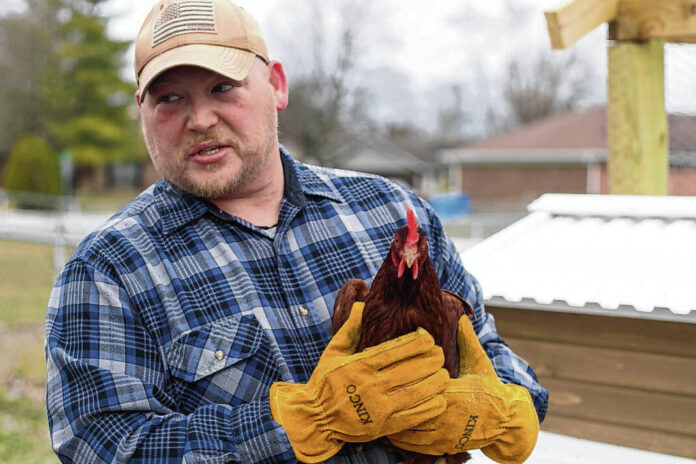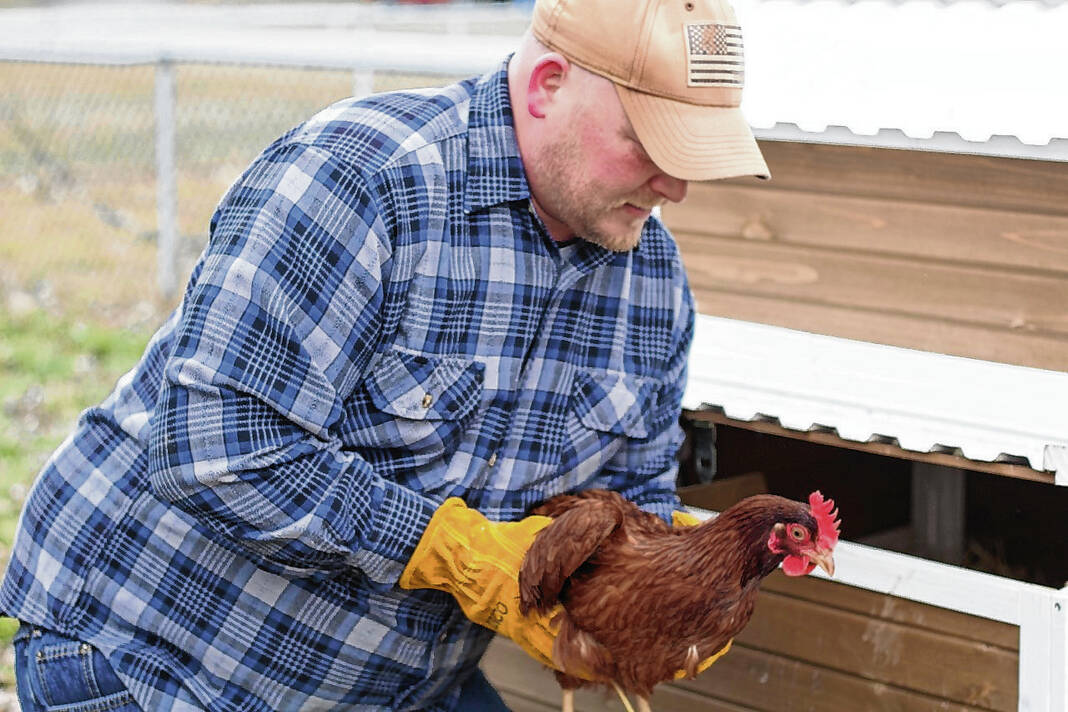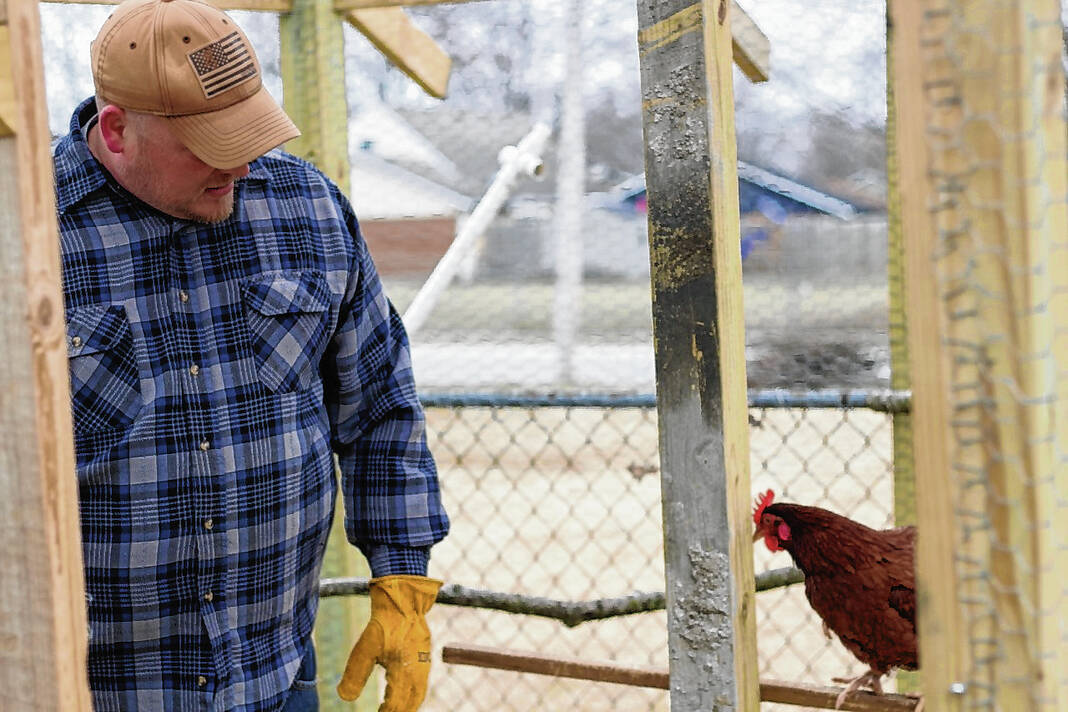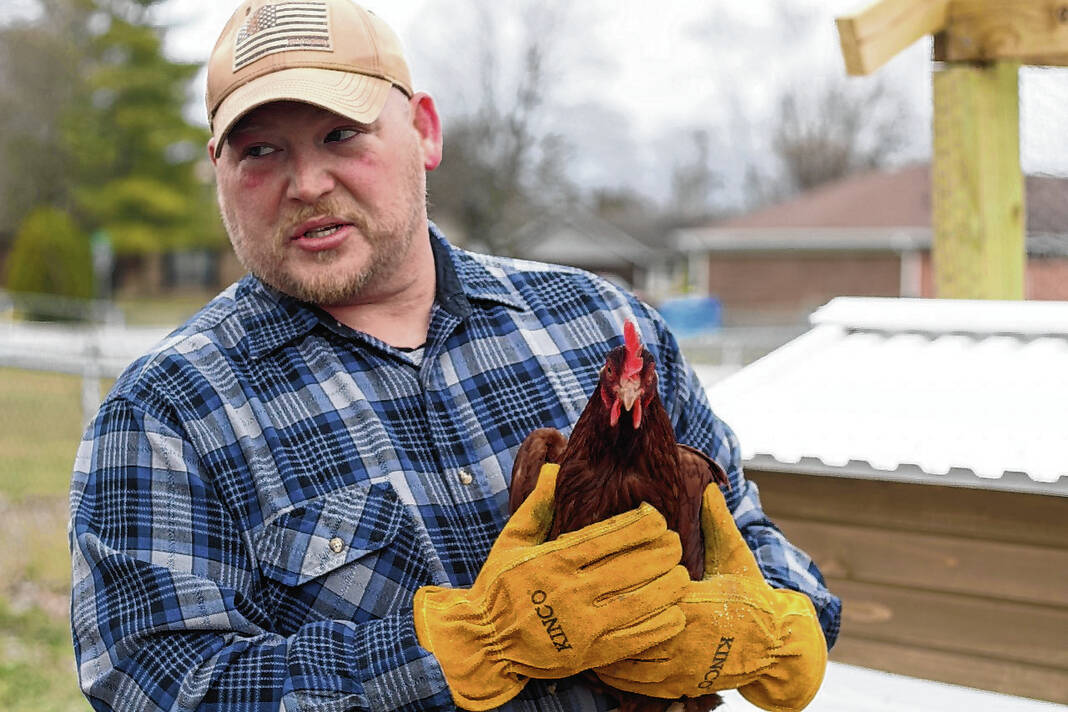
Whiteland resident Shawn Butler holds a chicken at his home on Friday afternoon. Butler bought a small flock of chickens to raise in his yard over a year ago, and he recently convinced the Whiteland Town Council to change town codes banning residential chicken ownership. Emily Ketterer | Daily Journal
Over a year ago, Shawn Butler purchased six chickens to keep in his side yard in Whiteland. The only problem — he wasn’t allowed to have them.
Two ordinances in the Whiteland town code prohibit residents from owning chickens on residentially zoned lots. The town considers owning a small poultry flock a “nuisance” if it is within 200 feet or less from another person’s house, according to town code.
Though Butler had already owned his chickens for a while at this point, the town notified him in January that owning chickens was in violation of these town ordinances.
Butler did not want give up though, since he had already owned his chickens for the past year, and saw the benefits they provided.
At the Whiteland Town Council’s Feb. 15 meeting, Butler pled his case for the town to change its ordinance. He noted the benefits of raising chickens, including self-sustainability.
One chicken will lay on average an egg a day. They are also good for making fertilizer for plants, they keep insects, such as mosquitoes, away and they also help reduce food waste by eating unused produce or leftovers.
With today’s grocery prices and the prices of eggs increasing, allowing people to become more self-sufficient is necessary, Butler said. Availability of food in the future is also a concern of his.
“I have a right to provide for my family the way I see fit, if it’s not damaging anyone else,” Butler said to the council. “Soon, things will be so expensive, the average person won’t be able to afford food … I’m not asking to have 40 chickens in my yard and sell them on the side of the road.”
Three out of five council members agreed with Butler, saying they would be for changing the town ordinance to allow residents to own a limited amount of chickens in their yards, if they wish.
Joe Sayler, council president, supported the idea of allowing small flocks of chickens. He personally had thought about owning chickens, but did not feel it was appropriate to bring it to the council as he is a current member.
He suggested a new ordinance be put in place to allow people to apply to the town if they want to own chickens. That process could give neighbors a chance to speak for or against if they want chickens to be next door to them. The ordinance would also have to limit the size of the flocks, and if a rooster could be allowed or not.
Owning backyard chickens is banned in most of Johnson County. Franklin has an ordinance banning ownership on residential lots, and so does Greenwood. Greenwood banned residents from owning small flocks in their backyards with a new ordinance passed in 2016.
New Whiteland also considers owning small poultry flocks a nuisance in residential lots, according to its town code. A New Whiteland resident last summer brought a petition with over 200 signatures to the New Whiteland Town Council asking them to change the ordinance, but nothing ever came of it.
Bargersville does not allow residents to own small flocks, but they can come before the Board of Zoning Appeals to request a zoning variance, the town code says. Trafalgar does not explicitly ban chicken ownership in its town code, and chickens, ducks and turkeys are defined as “domestic animals.”
Nearby, cities including Indianapolis and Bloomington allow residents to own small flocks in their backyards, with limitations on size and if residents can own roosters. Indianapolis allows residents to own up to 12 chickens and a rooster.
At his home in the Spring Hill subdivision, Butler’s fenced-in side yard has a chicken coop, space for them to roam and a garden.
He’s currently down to one chicken — named “Chicken” — at the moment. Two chickens in his original flock of six were taken by hawks. He also recently gave a few to his mother, who was looking to start raising chickens herself.
Butler built a new coop for his single chicken, and the new ones to come. This one has a roof made of plastic and chicken wire, to hopefully protect the chickens from hawks.
He isn’t overall worried about attracting more predators to the area because of the chickens. Possums and coyotes, for example, are already spotted around the area anyway. Other animals such as rabbits and even small dogs attract predators as well.
Raising chickens is a new experience for Butler and his family. He grew up in Whiteland, owning pets, but never livestock. He’s spent a lot of time researching chickens, how to take care of them and also how to use them for all their resources.
The chickens are fairly easy to take care of, he’s learned. They are not noisy, and it’s easy for him to mitigate any smell. His wife and children have also gotten involved in taking care of them, and they enjoy it.
“Most of the time in the summer, my kids come out here and do this, and they enjoy filling up water, filling up feed,” Butler said. “And then once every other month, I come out here and switch out their hay. It’s not even really a chore.”
Butler’s neighbors have been fine with him raising chickens in his yard for the past year. One of his neighbors, Dennis Clarkson, spoke to the town council in favor of changing the ordinance.
“I had reservations about seeing chickens next door,” Clarkson said. “I’ve been pleasantly surprised, and I have never been offended by any noises or any smells.”
The next step for Whiteland is the town will draft a new ordinance allowing chickens to be kept, with limitations. The council will then have to vote on the new ordinance.








